from Jul. 1, 1865
William Cullen Bryant Poem
-
Full Title
Poetical Tribute to President Lincoln - William Cullen Bryant
-
Description
Philadelphia publishing house J.B. Lippincott & Co. compiled poetical tributes to President Lincoln in the months after his assassination. This piece, by Poet William Cullen Bryant, speaks of Lincoln's life and greatest accomplishment, freeing the slave. Bryant was considered a child-prodigy, publishing his first poem at age ten and his first book when he was thirteen. He later served as editor for the New York Evening Post. He was a member of the Republican Party and actually introduced Abraham Lincoln at Cooper Union in New York when Lincoln gave his famed "Cooper Union Speech" in 1860.
-
Source
University of Wisconsin - Madison, Digitized by Google
-
Rights
This item is in the public domain and may be reproduced and used for any purpose, including research, teaching, private study, publication, broadcast or commercial use, with proper citation and attribution.
-
Tags
-
Cite this Item
William Cullen Bryant. "Poetical Tribute to President Lincoln - William Cullen Bryant". J. B. Lippincott & Co.. Remembering Lincoln. Web. Accessed June 15, 2025. https://rememberinglincoln.fords.org/node/1099
-
Creator
William Cullen Bryant
-
Publisher
J. B. Lippincott & Co.
-
Date
1865
from Jul. 1, 1865
Poetical Tribute to President Lincoln - William Cullen Bryant
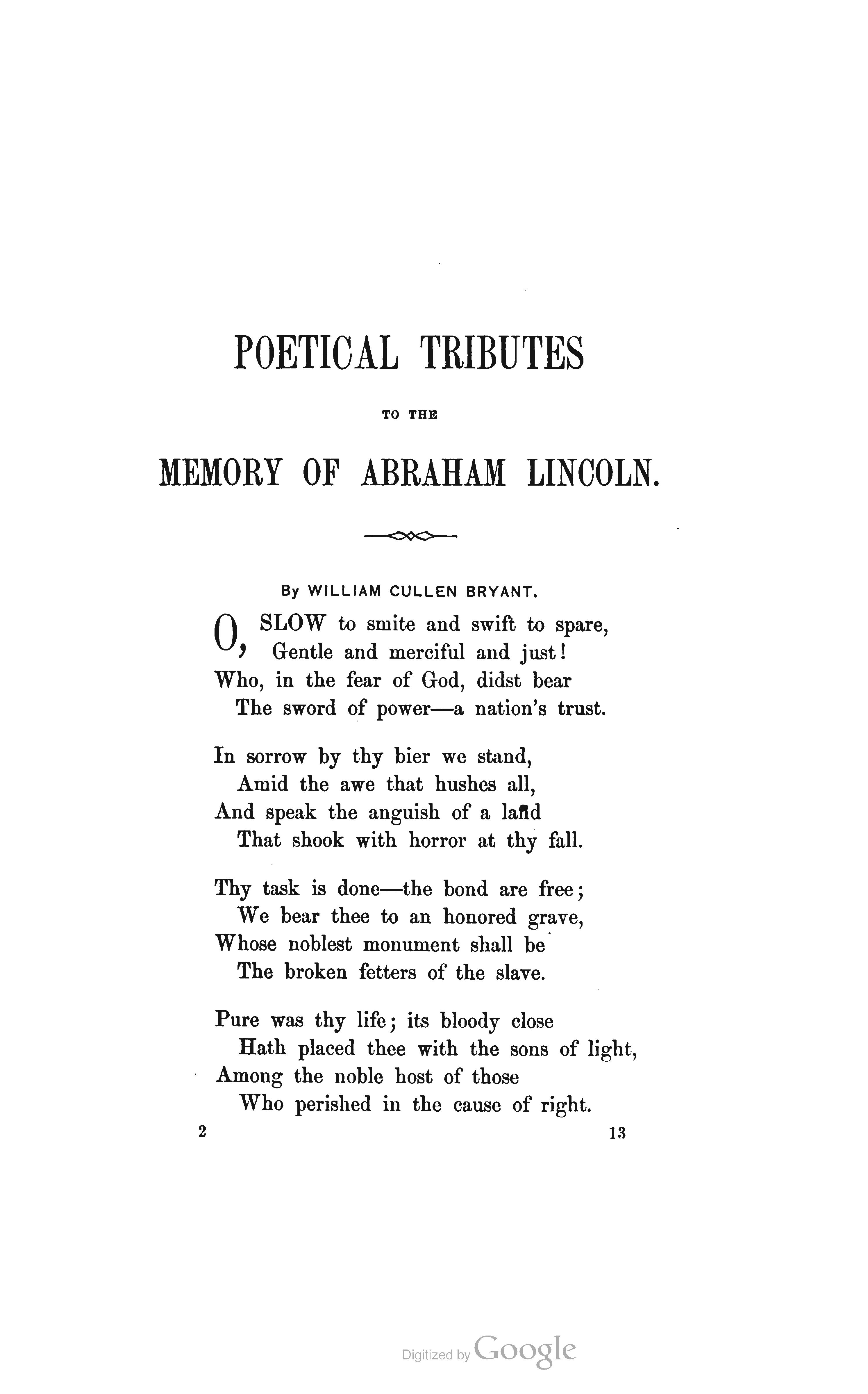
-
Description
Philadelphia publishing house J.B. Lippincott & Co. compiled poetical tributes to President Lincoln in the months after his assassination. This piece, by Poet William Cullen Bryant, speaks of Lincoln's life and greatest accomplishment, freeing the slave. Bryant was considered a child-prodigy, publishing his first poem at age ten and his first book when he was thirteen. He later served as editor for the New York Evening Post. He was a member of the Republican Party and actually introduced Abraham Lincoln at Cooper Union in New York when Lincoln gave his famed "Cooper Union Speech" in 1860.
-
Source
University of Wisconsin - Madison, Digitized by Google
-
Rights
This item is in the public domain and may be reproduced and used for any purpose, including research, teaching, private study, publication, broadcast or commercial use, with proper citation and attribution.
-
Creator
William Cullen Bryant
-
Publisher
J. B. Lippincott & Co.
-
Date
July 1, 1865
from Apr. 14, 1865
Diary of Orville Hickman Browning
-
Full Title
Diary of Orville Hickman Browning, Friend of Lincoln - Excerpts from April 14-19, 1865
-
Description
These are the diary entries of former U.S. Senator and friend of President Lincoln, Orville Hickman Browning, the day of Lincoln's assassination up to the funeral in Washington, DC on April 19, 1865. Browning discusses how he heard about the attacks and incorrectly states the Secretary of State Seward was killed. He talks about how Lincoln was the South's best ally within the government and speculates who the attacker was. Over the next few days he visits the White House and describes the body of the fallen president. These excerpts are part of the “Diary of Orville Hickman Browning Volume II: 1865-1881,” published in 1925 by the Illinois State Historical Library. Born in Kentucky in 1806, Browning moved to Quincy, Illinois to become a lawyer. Later he served as a U.S. Senator, adviser to Abraham Lincoln and Andrew Johnson, and even a cabinet minister. Browning and Lincoln became friends while serving in the state legislature; both were members of the Whig party. Browning served as an ally for Lincoln during his presidency.
-
Source
Hathi Trust Digital Library
-
Rights
The written permission of the copyright owners and/or other rights holders (such as publicity and/or privacy rights) is required for distribution, reproduction, or other use of protected items beyond that allowed by fair use or other statutory exemptions.
-
Tags
-
Cite this Item
Orville Hickman Browning. "Diary of Orville Hickman Browning, Friend of Lincoln - Excerpts from April 14-19, 1865". Illinois State Historical Library. Remembering Lincoln. Web. Accessed June 15, 2025. https://rememberinglincoln.fords.org/node/1098
-
Creator
Orville Hickman Browning
-
Publisher
Illinois State Historical Library
-
Date
April 14, 1865
-
Dimensions
22 cm.
from Apr. 14, 1865
Diary of Orville Hickman Browning, Friend of Lincoln - Excerpts from April 14-19, 1865
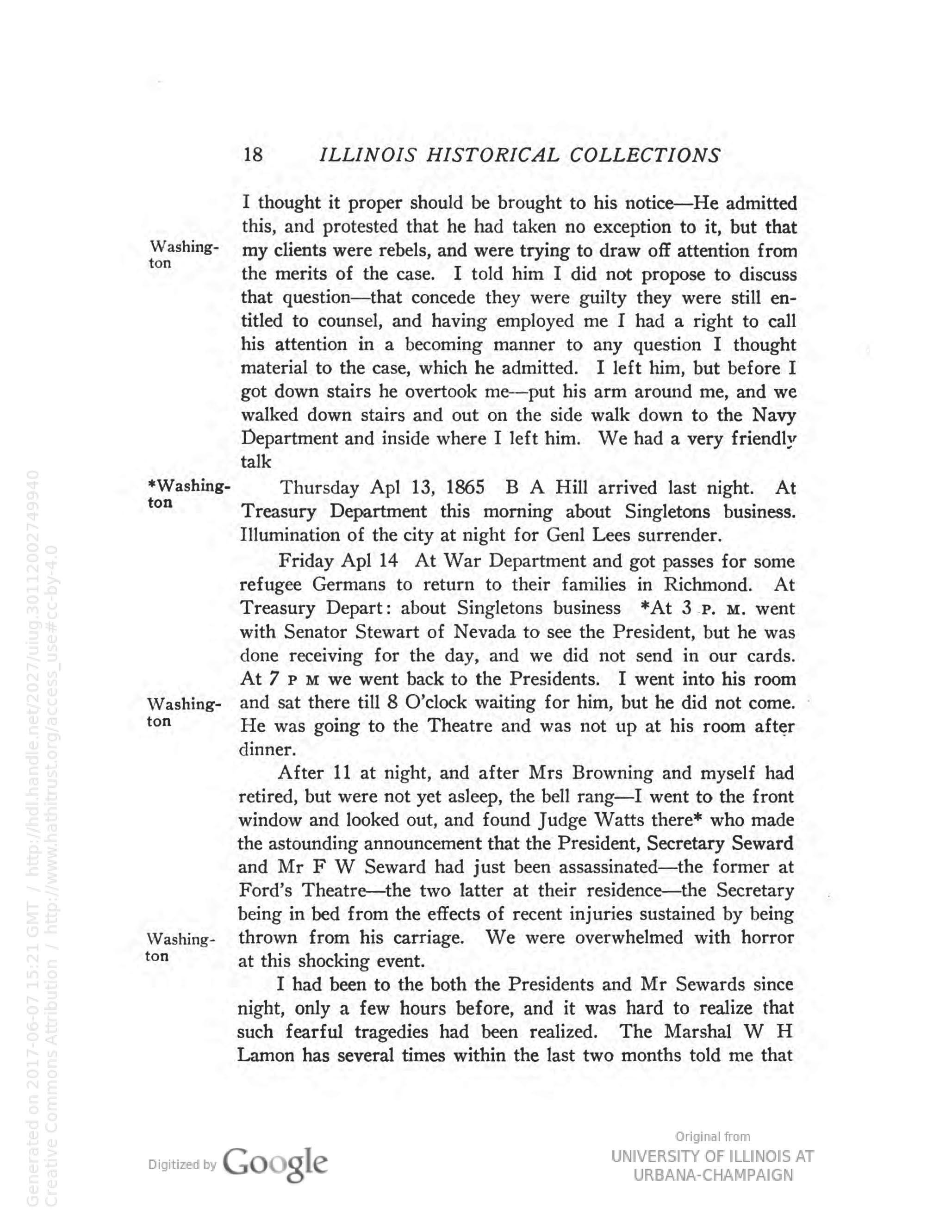
-
Description
These are the diary entries of former U.S. Senator and friend of President Lincoln, Orville Hickman Browning, the day of Lincoln's assassination up to the funeral in Washington, DC on April 19, 1865. Browning discusses how he heard about the attacks and incorrectly states the Secretary of State Seward was killed. He talks about how Lincoln was the South's best ally within the government and speculates who the attacker was. Over the next few days he visits the White House and describes the body of the fallen president. These excerpts are part of the “Diary of Orville Hickman Browning Volume II: 1865-1881,” published in 1925 by the Illinois State Historical Library. Born in Kentucky in 1806, Browning moved to Quincy, Illinois to become a lawyer. Later he served as a U.S. Senator, adviser to Abraham Lincoln and Andrew Johnson, and even a cabinet minister. Browning and Lincoln became friends while serving in the state legislature; both were members of the Whig party. Browning served as an ally for Lincoln during his presidency.
-
Source
Hathi Trust Digital Library
-
Rights
The written permission of the copyright owners and/or other rights holders (such as publicity and/or privacy rights) is required for distribution, reproduction, or other use of protected items beyond that allowed by fair use or other statutory exemptions.
-
Creator
Orville Hickman Browning
-
Publisher
Illinois State Historical Library
-
Date
April 14, 1865
-
Dimensions
22 cm.
from Apr. 20, 1865
Mayor's Proclamation on the Death of Abraham Lincoln - Brownville, Nebraska
-
Full Title
Brownville, Nebraska Territory Mayor's Proclamation on the Death of Abraham Lincoln
-
Description
The newly elected Mayor of Brownville, Nebraska Territory, Charles G. Dorsey, made a proclamation on the death of Abraham Lincoln, which was published in the Nebraska Advertiser the week after the President's death. The town of Brownville heard about Lincoln's death almost immediately. The city of Brownville was only about 10 years old at the time of Lincoln's assassination. The Nebraska Advertiser was founded in 1856 by a recent resident, Robert Wilkinson Furnas. Fumas was opposed to slavery and those views were often illustrated in the newspaper.
-
Source
-
Rights
This item is in the public domain and may be reproduced and used for any purpose, including research, teaching, private study, publication, broadcast or commercial use, with proper citation and attribution.
-
Tags
-
Cite this Item
Nebraska Advertiser. "Brownville, Nebraska Territory Mayor's Proclamation on the Death of Abraham Lincoln". Robert Wilkinson Furnas. Remembering Lincoln. Web. Accessed June 15, 2025. https://rememberinglincoln.fords.org/node/1097
-
Creator
Nebraska Advertiser
-
Publisher
Robert Wilkinson Furnas
-
Date
April 20, 1865
from Apr. 20, 1865
Brownville, Nebraska Territory Mayor's Proclamation on the Death of Abraham Lincoln

-
Description
The newly elected Mayor of Brownville, Nebraska Territory, Charles G. Dorsey, made a proclamation on the death of Abraham Lincoln, which was published in the Nebraska Advertiser the week after the President's death. The town of Brownville heard about Lincoln's death almost immediately. The city of Brownville was only about 10 years old at the time of Lincoln's assassination. The Nebraska Advertiser was founded in 1856 by a recent resident, Robert Wilkinson Furnas. Fumas was opposed to slavery and those views were often illustrated in the newspaper.
-
Source
-
Rights
This item is in the public domain and may be reproduced and used for any purpose, including research, teaching, private study, publication, broadcast or commercial use, with proper citation and attribution.
-
Creator
Nebraska Advertiser
-
Publisher
Robert Wilkinson Furnas
-
Date
April 20, 1865
from May. 13, 1865
Public Meeting at Peralta, NM - Resolution on the Death of President Lincoln
-
Full Title
Public Meeting at Peralta, NM - Resolution on the Death of President Lincoln, Santa Fe Weekly
-
Description
In May 1865, the Santa Fe Weekly Gazette published a summary of a meeting organized by the Probate Judge of Peralta, New Mexico. Peralta was named for the founder of Santa Fe, Don Pedro de Peralta, between 1607 and 1610. Both citizens of the county and Union military were present for the meeting to draft nine resolutions on the death of President Abraham Lincoln. The citizens expressed their sorrow and pledged their loyalty to the new president, Andrew Johnson. The resolutions were read in both Spanish and English. The meeting precedings were then sent to several newspapers throughout the territory, including the Santa Fe Weekly Gazette. The Santa Fe Weekly Gazette was in publication from April 1851 to September 1869 and was the most successful paper in the area up until that point, serving the capital of the province of New Mexico. The city had a population of about 4,500 by 1850. While in publication, the paper supported both Democratic and Republican causes. The paper's motto was "Independent in all things - neutral in nothing."
-
Source
Library of Congress Chronicling America
-
Rights
This item is in the public domain and may be reproduced and used for any purpose, including research, teaching, private study, publication, broadcast or commercial use, with proper citation and attribution.
-
Tags
-
Cite this Item
Santa Fe Weekly Gazette. "Public Meeting at Peralta, NM - Resolution on the Death of President Lincoln, Santa Fe Weekly". James L. Collins. Remembering Lincoln. Web. Accessed June 15, 2025. https://rememberinglincoln.fords.org/node/1095
-
Creator
Santa Fe Weekly Gazette
-
Publisher
James L. Collins
-
Date
May 13, 1865
from May. 13, 1865
Public Meeting at Peralta, NM - Resolution on the Death of President Lincoln, Santa Fe Weekly

-
Description
In May 1865, the Santa Fe Weekly Gazette published a summary of a meeting organized by the Probate Judge of Peralta, New Mexico. Peralta was named for the founder of Santa Fe, Don Pedro de Peralta, between 1607 and 1610. Both citizens of the county and Union military were present for the meeting to draft nine resolutions on the death of President Abraham Lincoln. The citizens expressed their sorrow and pledged their loyalty to the new president, Andrew Johnson. The resolutions were read in both Spanish and English. The meeting precedings were then sent to several newspapers throughout the territory, including the Santa Fe Weekly Gazette. The Santa Fe Weekly Gazette was in publication from April 1851 to September 1869 and was the most successful paper in the area up until that point, serving the capital of the province of New Mexico. The city had a population of about 4,500 by 1850. While in publication, the paper supported both Democratic and Republican causes. The paper's motto was "Independent in all things - neutral in nothing."
-
Source
Library of Congress Chronicling America
-
Rights
This item is in the public domain and may be reproduced and used for any purpose, including research, teaching, private study, publication, broadcast or commercial use, with proper citation and attribution.
-
Creator
Santa Fe Weekly Gazette
-
Publisher
James L. Collins
-
Date
May 13, 1865
from Apr. 15, 1865
A Proclamation by Rhode Island Governor
-
Full Title
A Proclamation by James Youngs Smith, Governor of the State of Rhode Island
-
Description
James Youngs Smith, the 29th Governor of Rhode Island, issued a proclamation on the day of Abraham Lincoln's assassination asking the clergy of Rhode Island to commemorate the President and pray for the country during the upcoming Sunday services. Born in Groton, Connecticut in 1809, Smith moved to Providence, Rhode Island at the age of 16 to work for a lumber business. Later in life he bought mills in both Connecticut and Rhode Island. He served three terms as Governor of Rhode Island as a Republican before declining to run for a fourth term. He served throughout the Civil War and was able to fill the state's troop quota through voluntary enlistment because the citizens of Rhode Island opposed drafting soldiers. Smith married Emily Brown, the daughter of a cotton manufacturer from Massachusetts and had three children.
-
Source
Library of Congress, Rare Book And Special Collections Division
-
Rights
Transmission or reproduction of protected items beyond that allowed by fair use requires the written permission of the copyright owners.
-
Tags
-
Cite this Item
James Y. Smith. "A Proclamation by James Youngs Smith, Governor of the State of Rhode Island". Rhode Island, Governor. Remembering Lincoln. Web. Accessed June 15, 2025. https://rememberinglincoln.fords.org/node/1093
-
Creator
James Y. Smith
-
Publisher
Rhode Island, Governor
-
Date
April 15, 1865
-
Material
Printed on page [1] of a single-folded sheet.
-
Dimensions
21 cm.
from Apr. 15, 1865
A Proclamation by James Youngs Smith, Governor of the State of Rhode Island
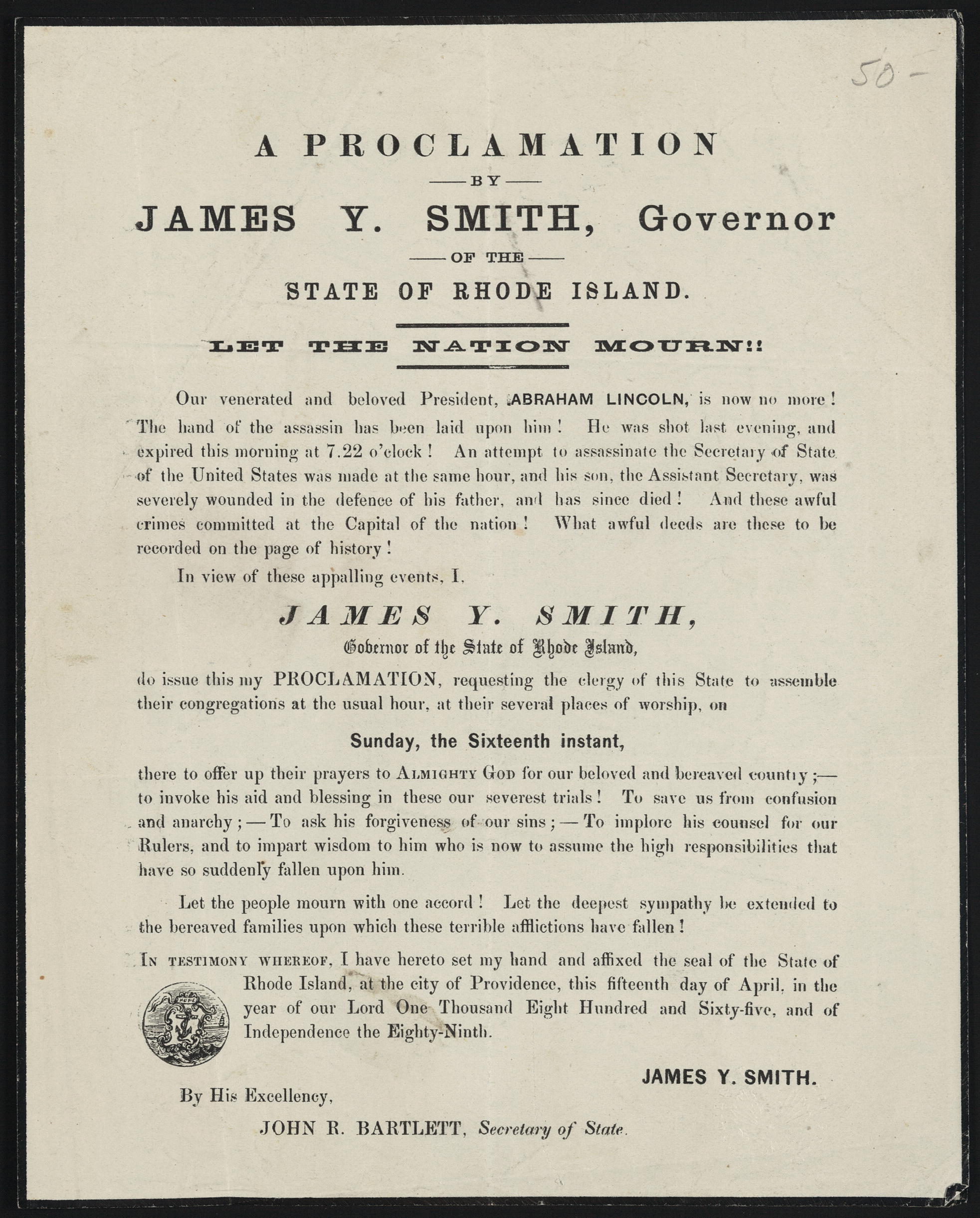
-
Description
James Youngs Smith, the 29th Governor of Rhode Island, issued a proclamation on the day of Abraham Lincoln's assassination asking the clergy of Rhode Island to commemorate the President and pray for the country during the upcoming Sunday services. Born in Groton, Connecticut in 1809, Smith moved to Providence, Rhode Island at the age of 16 to work for a lumber business. Later in life he bought mills in both Connecticut and Rhode Island. He served three terms as Governor of Rhode Island as a Republican before declining to run for a fourth term. He served throughout the Civil War and was able to fill the state's troop quota through voluntary enlistment because the citizens of Rhode Island opposed drafting soldiers. Smith married Emily Brown, the daughter of a cotton manufacturer from Massachusetts and had three children.
-
Source
Library of Congress, Rare Book And Special Collections Division
-
Rights
Transmission or reproduction of protected items beyond that allowed by fair use requires the written permission of the copyright owners.
-
Creator
James Y. Smith
-
Publisher
Rhode Island, Governor
-
Date
April 15, 1865
-
Material
Printed on page [1] of a single-folded sheet.
-
Dimensions
21 cm.
from Jan. 1, 1929
"Long, Long Ago" by Clara Clough Lenroot
-
Full Title
"Long, Long Ago" - Memoir of Clara Clough Lenroot, Childhood in Wisconsin
-
Description
Born in 1857, Clara Clough Lenroot was less than 10 years old when President Lincoln was assassinated. This excerpt, from her memoir "Long, Long Ago" published in 1929, highlights her family's reaction to the news as they were moving to their new home in the wilderness outside of Osceola Mills, Wisconsin. Her father, Solon H. Clough, was a lawyer from Fulton, New York who hoped to find fortune out West in the early 1860s. Later in life, Clara married Irvine Lenroot who served in the U.S. House of Representatives from 1909 to 1918 and in the U.S. Senate from 1918 to 1927. Throughout the 1930s their daughter Katharine fought to regulate child labor laws and successfully lobbied for the Fair Labor Standards Act of 1938, which also established a national minimum wage. Katharine also served as third Chief of the United States Children's Bureau.
-
Transcription
In April of that year we moved over to our own farm, about a mile away, and about two miles away from the village of Osceola. I recall one interesting incident of the day on which we took possession of the farm. It was April, 1865. We were driving to our new home. Arriving at a little brook, father drove the horse into the stream to water him. As we waited a man came along on horseback, drew rein on the bridge, and beckoned to father. He drove through the stream, got out of the buggy and approached the man, who spoke a few words to him in a low, earnest voice. Father uttered an exclamation of dismay, and came back and told Mother the astounding news that Lincoln had been assassinated! So was that tremendous news transmitted to us, undoubtedly two or three days after its occurrence, as we had no telegraphic communication. The dreadful news permeated slowly by some such means as it came to us to the remotest parts of the country.
We rode on in silence. We little girls sensed the fact that calamity had overtaken our world. We were hushed by the sorrow in our parents’ faces, and asked no questions. In sad silence we approached the farmhouse that was to be our home, an event which we had anticipated with tremendous excitement and curiosity. Arrived at the little home, father and mother made some pretence of arranging the household goods, but mother soon seated herself upon a bench outside the kitchen door, and tears ran down her face. Father came and sat beside her, wiping his own eyes, and took her hand in his. We children stood around, more and more impressed by their grief. Little was done towards settling the new home that day.
(In sharp contrast to the slow progress of the news of Lincoln’s assassination came the news of President Harding’s death in 1923 to a rural camp in the midst of the pine forest. There a radio set had been installed. Mrs. Claude Luse, alone in her camp near Gordon, Wisconsin, children and maid in bed, was listening to a fine concert being radioed from the Drake Hotel in Chicago. A singer had just begun a solo. She had sung but a few words when the music stopped and a voice said, “We have just had word that President Harding died in San Francisco ten minutes ago; stand by for confirmation.” In a few seconds the statement was confirmed. Mrs. Luse’s neighbor, Mr. Gallaher, starting to town early the next morning, carried the news with him along the route.)
[Transcription by: Kyra S., Dr. Susan Corbesero’s Class, Ellis School, Pittsburgh, Pennsylvania] -
Source
Library of Congress, General Collections and Rare Book and Special Collections Division
-
Rights
The written permission of the copyright owners and/or other rights holders (such as publicity and/or privacy rights) is required for distribution, reproduction, or other use of protected items beyond that allowed by fair use or other statutory exemptions.
-
Tags
-
Cite this Item
Clara Clough Lenroot. ""Long, Long Ago" - Memoir of Clara Clough Lenroot, Childhood in Wisconsin". Badger Printing Company. Remembering Lincoln. Web. Accessed June 15, 2025. https://rememberinglincoln.fords.org/node/1092
-
Creator
Clara Clough Lenroot
-
Publisher
Badger Printing Company
-
Date
1929
-
Dimensions
24 cm.
from Jan. 1, 1929
"Long, Long Ago" - Memoir of Clara Clough Lenroot, Childhood in Wisconsin
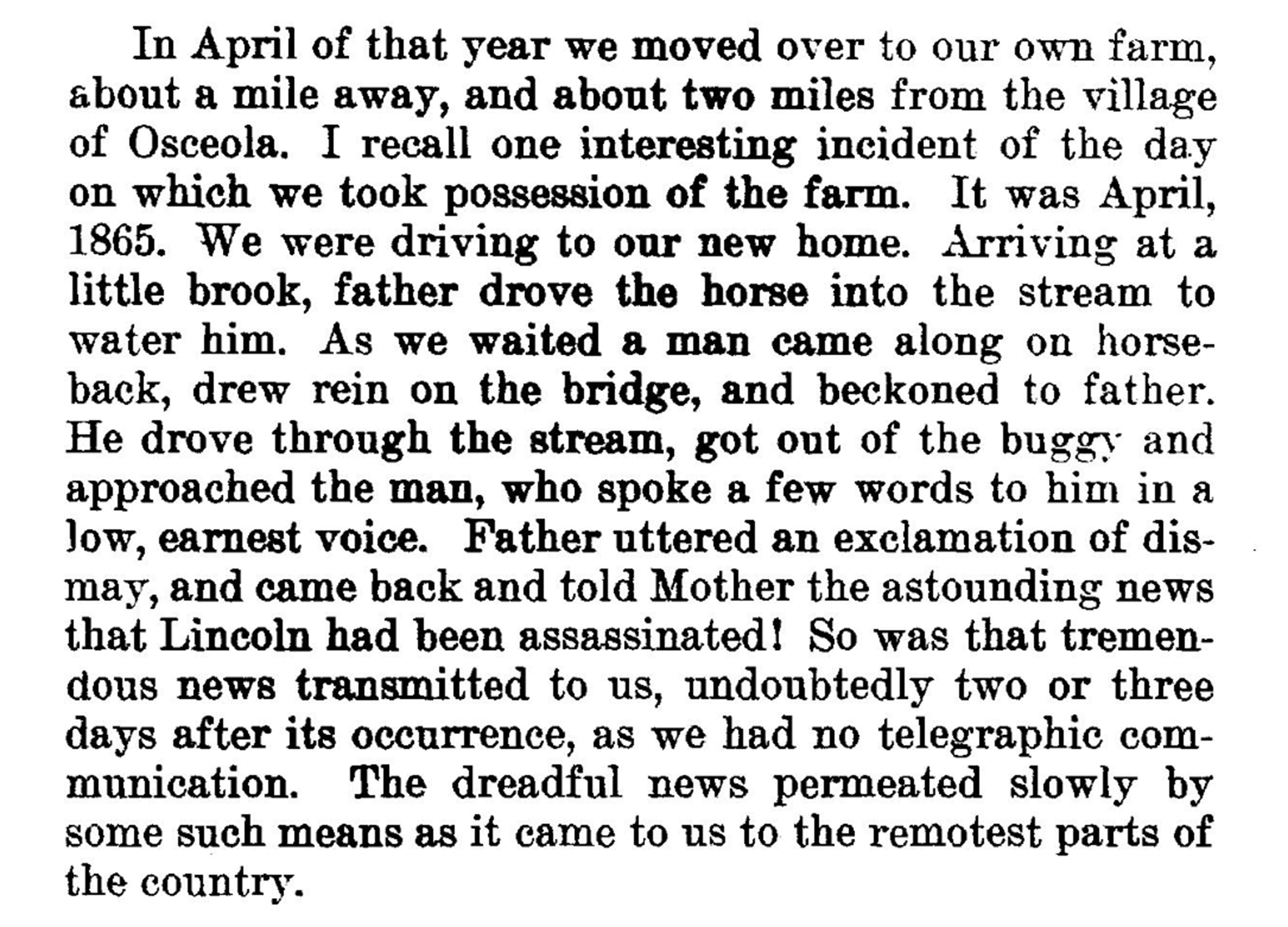
-
Description
Born in 1857, Clara Clough Lenroot was less than 10 years old when President Lincoln was assassinated. This excerpt, from her memoir "Long, Long Ago" published in 1929, highlights her family's reaction to the news as they were moving to their new home in the wilderness outside of Osceola Mills, Wisconsin. Her father, Solon H. Clough, was a lawyer from Fulton, New York who hoped to find fortune out West in the early 1860s. Later in life, Clara married Irvine Lenroot who served in the U.S. House of Representatives from 1909 to 1918 and in the U.S. Senate from 1918 to 1927. Throughout the 1930s their daughter Katharine fought to regulate child labor laws and successfully lobbied for the Fair Labor Standards Act of 1938, which also established a national minimum wage. Katharine also served as third Chief of the United States Children's Bureau.
-
Source
Library of Congress, General Collections and Rare Book and Special Collections Division
-
Rights
The written permission of the copyright owners and/or other rights holders (such as publicity and/or privacy rights) is required for distribution, reproduction, or other use of protected items beyond that allowed by fair use or other statutory exemptions.
-
Creator
Clara Clough Lenroot
-
Publisher
Badger Printing Company
-
Date
January 1, 1929
-
Dimensions
24 cm.
from Apr. 28, 1865
Lincoln Assassination, April 28th, 1865
-
Full Title
El Nuevo Mundo: Lincoln Assassination, April 28th, 1865
-
Description
El Nuevo Mundo [The New World], was a Spanish tri-weekly newspaper dedicated to the interest of Republicanism in the Americas; copies were circulated throughout California, Mexico, Central America, and South America. In this issue, the newspaper included an illustration and an account from an eyewitness of the assassination of Lincoln in the Ford Theatre. Taking place two weeks after the assassination, El Nuevo Mundo reporters attended a Mexican Patriotic Club meeting in Virginia, Nevada. The President of the club gave a speech, expressing a thirst for justice and the fall of the Confederacy. The Society of Patriotic Women of Virginia City was also in attendance at the meeting in junction with the men of the Mexican Patriotic Club, whose president also gave a speech in front of the entire body. In a slightly altered manner, she spoke of not merely a hopeful defeat of the Confederates, but of return to union.
-
Transcription
“The Lady Harris, who was in the box with the president, gives the following account: The assassin entered in the box, and Major Rathburn [Henry Rathbone] got up and asked the intruder what business had him there. Without answering he ran inside, and placed the gun to the head of the president, fired, and in that instant he jumped onto the balustrade of the box and made a threatening motion with a dagger he carried, pointed at the face or chest of Mr. Lincoln… Major Rathburn [Rathbone] jumped forward to protect the president, grabbed the assassin by the end of his frock and was stabbed in the arm. The assassin then jumped onto the stage and fled – Dispatch of the associated press”
-
Source
Newsbank
-
Rights
Use of this item for research, teaching, and private study is permitted with proper citation and attribution. Reproduction of this item for publication, broadcast, or commercial use requires written permission.
-
Tags
-
Cite this Item
El Nuevo Mundo. "El Nuevo Mundo: Lincoln Assassination, April 28th, 1865 ". El Nuevo Mundo. Remembering Lincoln. Web. Accessed June 15, 2025. https://rememberinglincoln.fords.org/node/1090
from Apr. 28, 1865
El Nuevo Mundo: Lincoln Assassination, April 28th, 1865
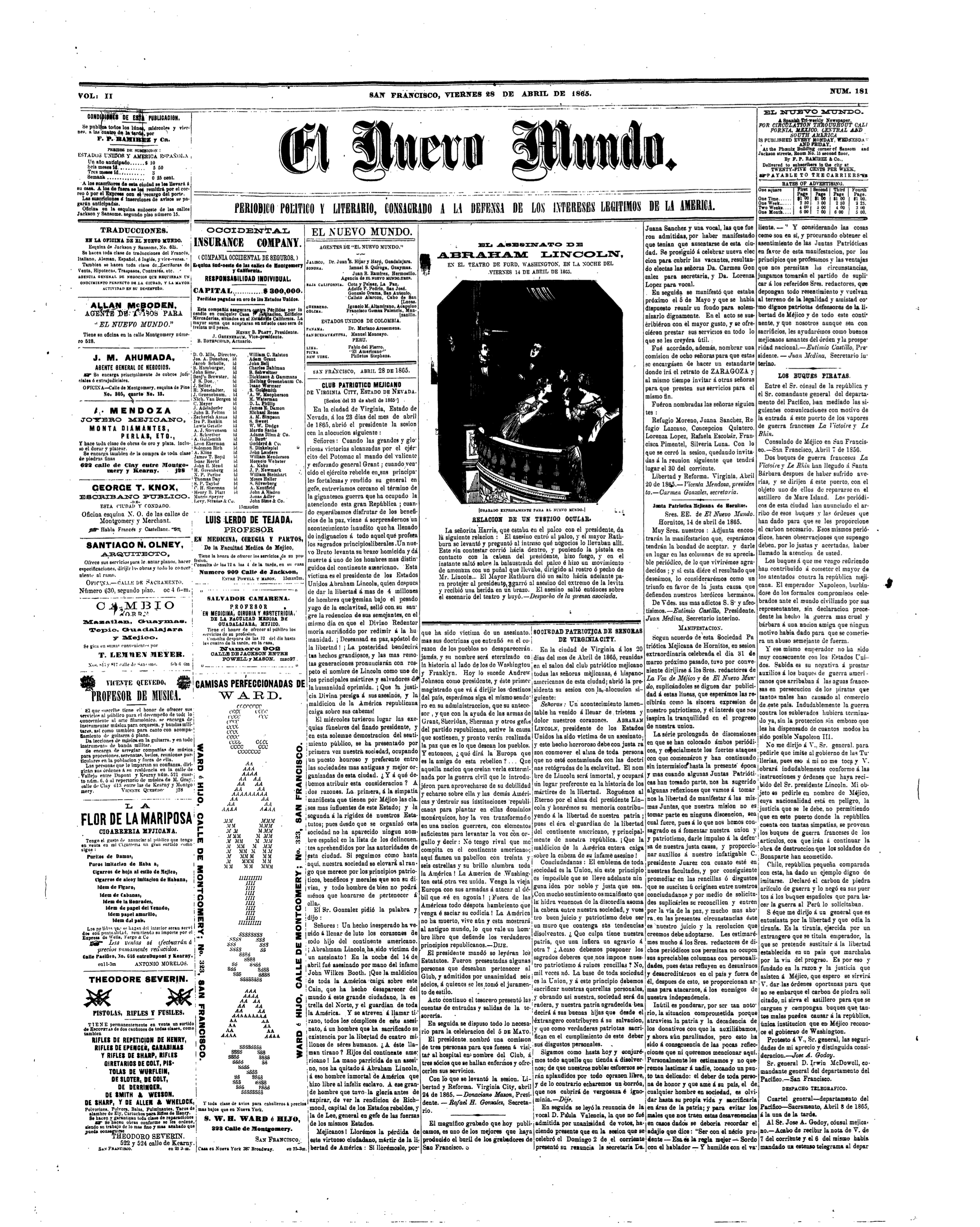
-
Description
El Nuevo Mundo [The New World], was a Spanish tri-weekly newspaper dedicated to the interest of Republicanism in the Americas; copies were circulated throughout California, Mexico, Central America, and South America. In this issue, the newspaper included an illustration and an account from an eyewitness of the assassination of Lincoln in the Ford Theatre. Taking place two weeks after the assassination, El Nuevo Mundo reporters attended a Mexican Patriotic Club meeting in Virginia, Nevada. The President of the club gave a speech, expressing a thirst for justice and the fall of the Confederacy. The Society of Patriotic Women of Virginia City was also in attendance at the meeting in junction with the men of the Mexican Patriotic Club, whose president also gave a speech in front of the entire body. In a slightly altered manner, she spoke of not merely a hopeful defeat of the Confederates, but of return to union.
-
Source
Newsbank
-
Rights
Use of this item for research, teaching, and private study is permitted with proper citation and attribution. Reproduction of this item for publication, broadcast, or commercial use requires written permission.
-
Creator
El Nuevo Mundo
-
Publisher
El Nuevo Mundo
-
Date
April 28, 1865
-
Material
newspaper
from Jan. 31, 1866
Joseph S. Caulk to Andrew Johnson and Edwin M. Stanton
-
Full Title
Joseph S. Caulk to Andrew Johnson and Edwin M. Stanton
-
Description
Joseph S. Caulk, a veteran of Company K of the 24th Regiment of the U.S. Colored Infantry, wrote to President Andrew Johnson and Secretary of War Edwin Stanton seeking permission to march while armed to honor the deceased President Abraham Lincoln's birthday in 1866. Caulk, a bricklayer from Delaware, enlisted in the U.S. Army at age 44 on March 28, 1865, shortly before the surrender of Confederate General Robert E. Lee.
-
Transcription
Wilmington Jan 31th 1866
Sir
Mr President or Secatary of Ware by Permishin i take the liberty to ask you to be so kind as to gave us the Returnd Soldears of the State of Delawear a permit to turn under armes on the 12th of Februeary to Silabrat of our Well belovid Mr Aberham Lincoln birth day our opposers has Sead the collard pepel Wor going to rase but person With comon Sence Wold know better yours With respect Write to
Joseph S. Caulk W. 7. St No 214
Wilmington, Del– -
Source
Shared by Jonathan White, associate professor of American Studies at Christopher Newport University. Joseph S. Caulk to Andrew Johnson and Edwin M. Stanton, January 31, 1866, in RG 107 (Records of the Office of the Secretary of War), microfilm M494 (Letters Received by the Secretary of War From the President, Executive Departments, and War Department Bureaus, 1862-1870), reel 84.
-
Rights
This item is in the public domain may be reproduced and used for any purpose, including research, teaching, private study, publication, broadcast or commercial use, with proper citation and attribution.
-
Tags
-
Cite this Item
Joseph S. Caulk. "Joseph S. Caulk to Andrew Johnson and Edwin M. Stanton". Remembering Lincoln. Web. Accessed June 15, 2025. https://rememberinglincoln.fords.org/node/1087
-
Creator
Joseph S. Caulk
-
Date
January 31, 1866
from Jan. 31, 1866
Joseph S. Caulk to Andrew Johnson and Edwin M. Stanton
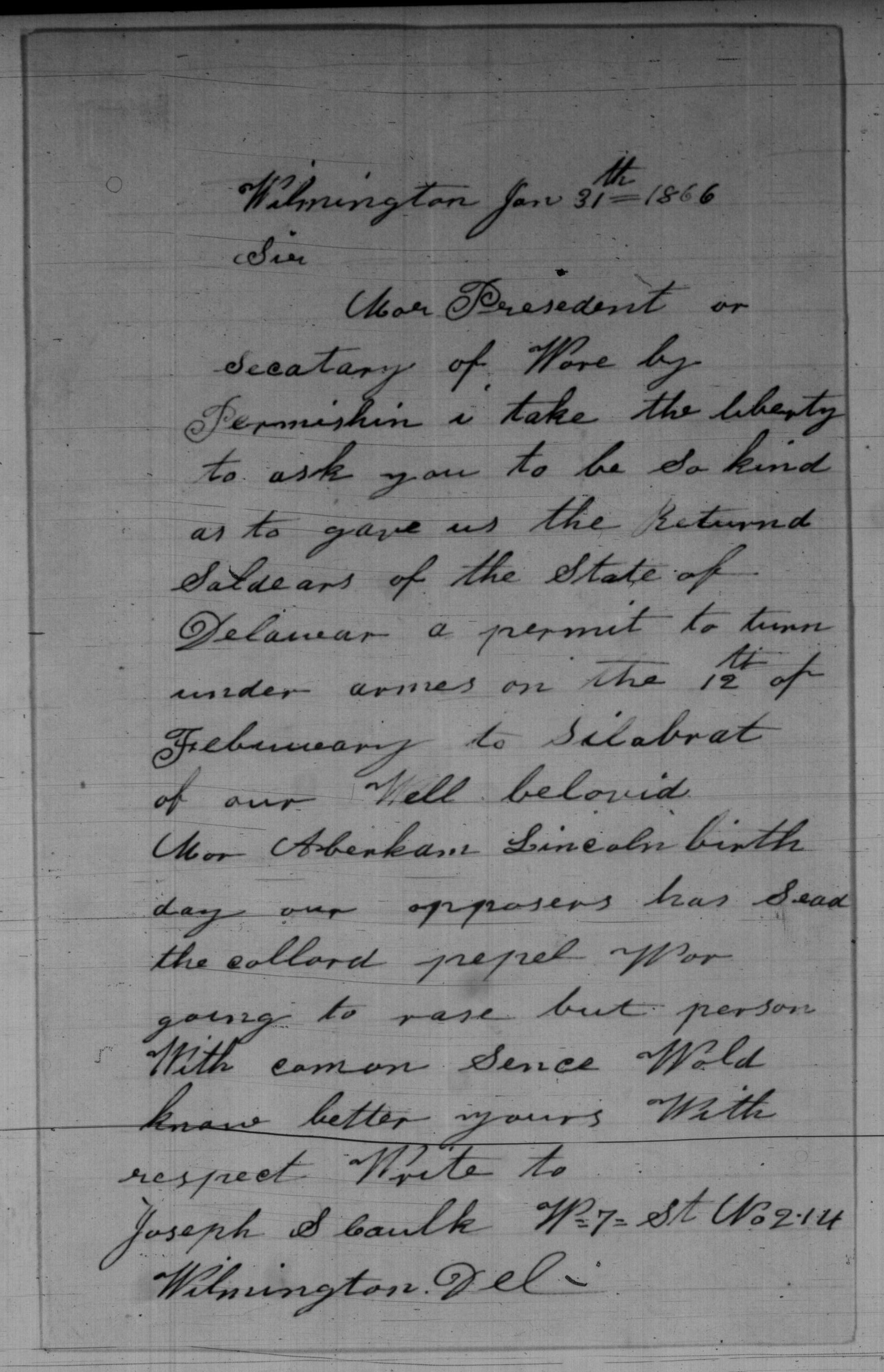
-
Description
Joseph S. Caulk, a veteran of Company K of the 24th Regiment of the U.S. Colored Infantry, wrote to President Andrew Johnson and Secretary of War Edwin Stanton seeking permission to march while armed to honor the deceased President Abraham Lincoln's birthday in 1866. Caulk, a bricklayer from Delaware, enlisted in the U.S. Army at age 44 on March 28, 1865, shortly before the surrender of Confederate General Robert E. Lee.
-
Source
Shared by Jonathan White, associate professor of American Studies at Christopher Newport University. Joseph S. Caulk to Andrew Johnson and Edwin M. Stanton, January 31, 1866, in RG 107 (Records of the Office of the Secretary of War), microfilm M494 (Letters Received by the Secretary of War From the President, Executive Departments, and War Department Bureaus, 1862-1870), reel 84.
-
Rights
This item is in the public domain may be reproduced and used for any purpose, including research, teaching, private study, publication, broadcast or commercial use, with proper citation and attribution.
-
Creator
Joseph S. Caulk
-
Date
January 31, 1866
from Apr. 23, 1865
Patriotic Club of Mexico
-
Full Title
Patriotic Club of Mexico
-
Description
On April 23, 1865, the Patriotic Club of Mexico called a special meeting of it's members in the mining town of Virginia City, Nevada. Latinos across the West who had supported Lincoln and the Union cause were shocked, and they gathered to reflect on the assassination and it's international impact. Meetings were often organized around "juntas patrioticas", patriotic assemblies of Latinos formed in the aftermath of the 1862 French invasion of Mexico. This is an excerpt from a speech given by Rafael H. Gonzalez, a member of the club, who shares his lament for the assassination of Abraham Lincoln and uncertainty about the nation's future.
-
Transcription
Mr. Gonzalez requested the floor and said:
Gentlemen: An unexpected event has come to fill with grief the hearts of every son of America. Abraham Lincoln has become a victim of assassination! On the night of April 14, he was assassinated by the hand of the villainous John Wilkes Booth. May the curse of all the Americas fall on this Cain for this evil of taking from the world this great citizen, the Northern Star, and the guardian angel of all the Americas. To dare call tyrants, all the accomplices of this assassination, of a man who sacrificed his existence for the liberty of 4 million human beings. Do you call this tyranny? Sons of America! The parricidal hand of an assassin has taken Abraham Lincoln, that immortal man of America who freed the miserable slaves. That great man had the glory, before he expired, to see the surrender of Richmond, capital of the Rebel states, and Lee, general of those forces.
Mexicans! Let us cry for the loss of this virtuous citizen, martyr for the liberty of America. Let us cry because he has become the victim of an assassin. His teachings engraved upon the hearts of the people shall never disappear, and his name shall eternally live in history alongside Washington and Franklin. Now succeeded by Andrew Johnson as president, and this first magistrate that will direct the destiny of this country, we hope he follows the same path with his administration that his predecessor, and with the help of Grant, Sheridan, Sherman, and other members of the Republican party, mobilize the movement they uphold, and soon they will realize the peace the people desire.
-
Rights
TY - NEWS N1 - Provider: NewsBank/Readex, Database: America's Historical Newspapers, SQN: 11ED162540E86FE8 TI - Club Patriotico Mejicano De Virginia City, Estado De Nevada PY - 1865/04/28 JF - Voz del Nuevo Mundo JA - El Nuevo Mundo SP - 1 CP - San Francisco, California ER -
-
Tags
-
Cite this Item
Club Patriotico Mejicano. "Patriotic Club of Mexico". Voz del Nuevo Mundo. Remembering Lincoln. Web. Accessed June 15, 2025. https://rememberinglincoln.fords.org/node/1086
from Apr. 23, 1865
Patriotic Club of Mexico

-
Description
On April 23, 1865, the Patriotic Club of Mexico called a special meeting of it's members in the mining town of Virginia City, Nevada. Latinos across the West who had supported Lincoln and the Union cause were shocked, and they gathered to reflect on the assassination and it's international impact. Meetings were often organized around "juntas patrioticas", patriotic assemblies of Latinos formed in the aftermath of the 1862 French invasion of Mexico. This is an excerpt from a speech given by Rafael H. Gonzalez, a member of the club, who shares his lament for the assassination of Abraham Lincoln and uncertainty about the nation's future.
-
Rights
TY - NEWS N1 - Provider: NewsBank/Readex, Database: America's Historical Newspapers, SQN: 11ED162540E86FE8 TI - Club Patriotico Mejicano De Virginia City, Estado De Nevada PY - 1865/04/28 JF - Voz del Nuevo Mundo JA - El Nuevo Mundo SP - 1 CP - San Francisco, California ER -
-
Creator
Club Patriotico Mejicano
-
Publisher
Voz del Nuevo Mundo
-
Date
April 23, 1865
from Apr. 14, 1865
Silas H. Billings Diary
-
Full Title
Silas H. Billings Diary
-
Description
Silas H. Billings was a U.S. Army soldier from Lafayette, New York, wounded at the Battle of Winchester in September 1864. In April 1865 he was a patient at Saterlee Hospital in Philadelphia, Pennsylvania, when he learned that John Wilkes Booth had assassinated President Abraham Lincoln. Billings then received permission to attend Lincoln's funeral in Philadelphia. Like many people at the time, Billings recorded both newsworthy events, like Lincoln's assassination, and the details of his everyday life together. After the Civil War, Billings became a school teacher and part-time farmhand. His wounds led to his death in 1873, at the age of only 30.
-
Transcription
[inside cover]
Silas H. Billings
Wounded at
Winchester Va
Sept 19 1864
[Friday, April 14, 1865]
Abraham Lincoln
is Shot at Fords
Theatre at 9,30 p m and dies at 722 am
Wm H & Fred Seward are stabbed at or
about the same time
[Saturday, April 15, 1865]
my eye is very bad
[Wednesday, April 19, 1865]
Funeral of our Chief
Abraham Lincoln
President of the
U S of America
Recd a Visit from
C F Falch co. "D" 9 ny
Ward 2 Turners Lane
[Saturday, April, 22, 1865]
Recd a pass 2 pm to 9 pm
went downtown to Corner
of Broad & Prime Sts
Funeral Train of the
late President A Lincoln
arrives at 4,30 pm
Procession is formed in
Broad & goes down to
Walnut up to 21st
down to Vine down to
2nd up to Chesnut to
Independence Hall on
Chesnut between 5th & 6th
-
Source
Marjorie Billings Martinez, great-granddaughter of Silas H. Billings
-
Rights
This item may be reproduced and used for any purpose, including research, teaching, private study, publication, broadcast or commercial use, with proper citation and attribution.
-
Tags
-
Cite this Item
Silas H. Billings. "Silas H. Billings Diary". Remembering Lincoln. Web. Accessed June 15, 2025. https://rememberinglincoln.fords.org/node/1040
-
Creator
Silas H. Billings
-
Date
April 14, 1865
from Apr. 14, 1865
Silas H. Billings Diary
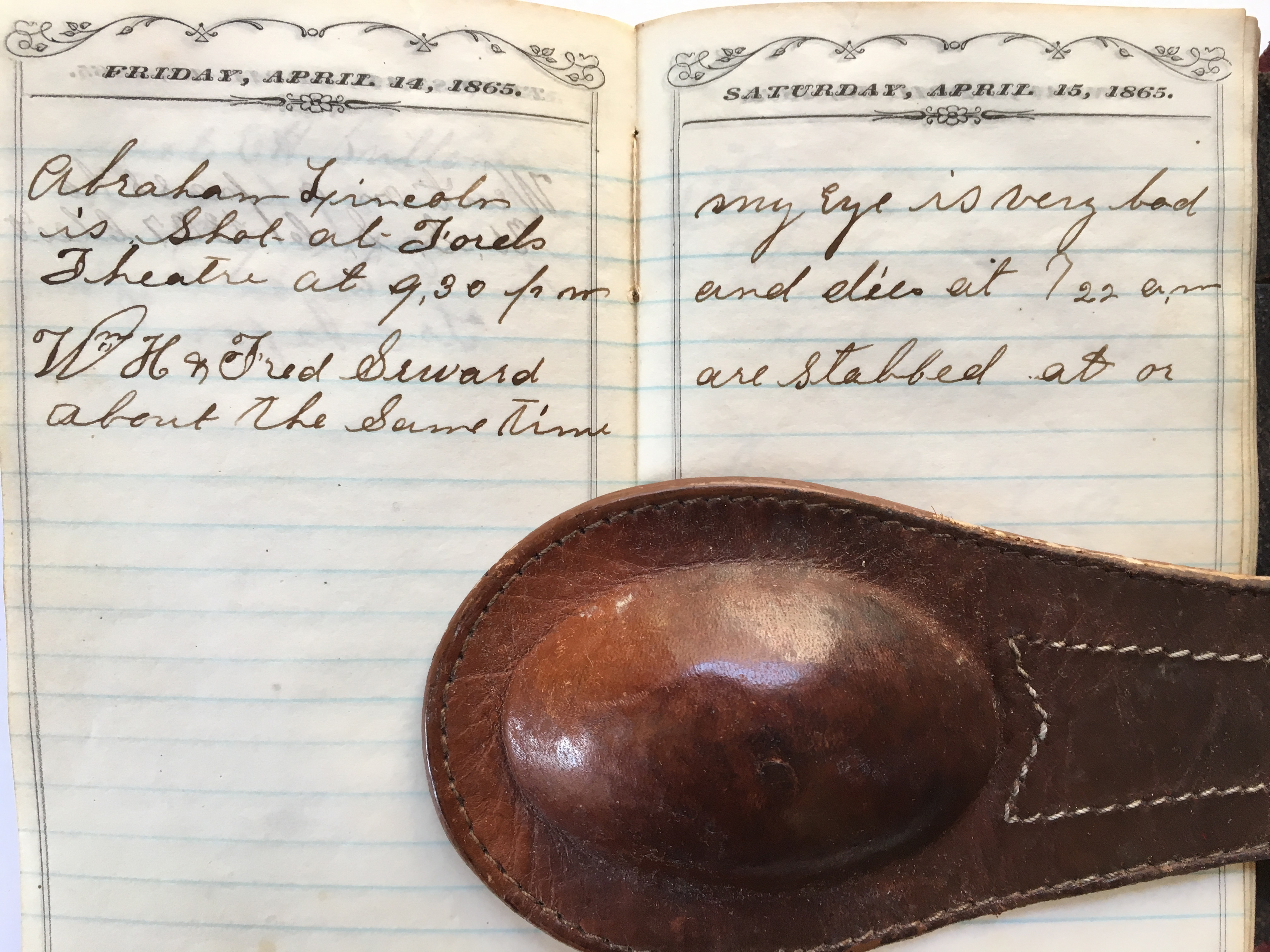
-
Description
Silas H. Billings was a U.S. Army soldier from Lafayette, New York, wounded at the Battle of Winchester in September 1864. In April 1865 he was a patient at Saterlee Hospital in Philadelphia, Pennsylvania, when he learned that John Wilkes Booth had assassinated President Abraham Lincoln. Billings then received permission to attend Lincoln's funeral in Philadelphia. Like many people at the time, Billings recorded both newsworthy events, like Lincoln's assassination, and the details of his everyday life together. After the Civil War, Billings became a school teacher and part-time farmhand. His wounds led to his death in 1873, at the age of only 30.
-
Source
Marjorie Billings Martinez, great-granddaughter of Silas H. Billings
-
Rights
This item may be reproduced and used for any purpose, including research, teaching, private study, publication, broadcast or commercial use, with proper citation and attribution.
-
Creator
Silas H. Billings
-
Date
April 14, 1865
